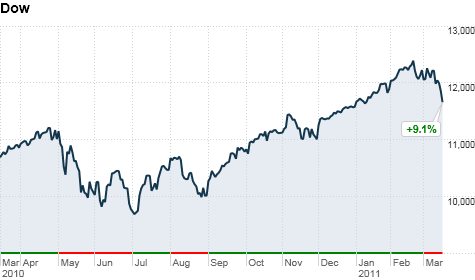Stock sell-off accelerates

NEW YORK (CNNMoney) -- The sell-off in U.S. stocks accelerated Wednesday afternoon, with all three major indexes down about 2%.
Trading has been extremely choppy as investors try to sort out disappointing U.S. housing data against the backdrop of developments in Japan.
It didn't help that European Union energy commissioner Günther Oettinger sounded a warning bell about increasing risks related to Japanese nuclear reactors during a European Parliament committee meeting in Brussels.
"Today's not a good news day, and the market is reacting emotionally," said Fred Dickson, chief market strategist at D.A. Davidson & Co.
With about two hours remainin in the session, the Dow Jones industrial average (INDU) plunged 267 points, or 2.3%, with all but one of the blue chip index's 30 components drifting lower. IBM (IBM, Fortune 500), General Electric (GE, Fortune 500) and Boeing (BA, Fortune 500) led the decline.
The S&P 500 (SPX) slipped 29 points, or 2.3%. Tech companies were also big laggards on the broad index. Sandisk (SNDK), IBM and Qualcomm (QCOM, Fortune 500) were all down about 4%.
Meanwhile, the Nasdaq (COMP) lost 56 points, or 2%.
Dickson is advising his clients to take the sidelines until the picture of the nuclear threat in Japan becomes clearer.
Wednesday's declines come on the heels of a sharp sell-off in the previous session, which was dominated by worries about a nuclear crisis in Japan.
Japan in crisis: In a televised speech Wednesday, Japan's emperor told citizens not to give up hope as the country grapples with an epic earthquake.
"It's quite rare of the emperor to appear on television, and that has made investors a little nervous," said David Jones, chief market strategist with IG Markets in London.
Prior to the speech, Tokyo's Nikkei index rose 5.7%, rebounding from two days of losses that had drained more than 16% from the index.
The increasingly desperate situation at Japan's nuclear plants is keeping investors on edge.
Stunned by the devastation in Japan, they have been reducing their exposure to risky assets and flocking to investments that are considered safe, including U.S. Treasuries. Investors continued to buy up U.S. government debt Wednesday, sending the 10-year yield down to 3.23% from 3.32% late Tuesday.
Aside from Japan, Moody's Investors Service cut Egypt's rating by one notch, further into non-investment grade quality.
And late Tuesday, Moody's downgraded Portugal's credit rating from A1 to A3 -- a lower investment grade status. And Fitch downgraded Bahrain's debt to below investment grade, following a government clash with protestors.
Asian markets ended higher, with the Shanghai Composite index rising 1.2% and Hong Kong's Hang Seng index edging up 0.1%. Meanwhile, European markets closed sharply lower. The FTSE 100 dropped 0.8%, and France's CAC 40 and DAX in Germany tumbled more than 1%. (World markets)
Economy: The government said new home construction fell 22.5% in February, more than economists were expecting, while the number of permits for future housing construction fell 8.2% to all all-time low.
Separately, the government's Producer Price Index showed that prices at the wholesale level jumped 1.6% in February, which was much more than expected. Core PPI, which excludes food and energy costs, increased by 0.2% in the month, matching expectations.
Currencies and commodities: The dollar gained against the euro and the British pound, but eased against the Japanese yen.
Oil prices -- which fell nearly 4% on Tuesday -- were higher early Wednesday, as concerns the ongoing turmoil in North Africa and the Middle East were revived. Oil for April delivery gained $1.00, or 1%, to $98.18 a barrel.
Gold futures for April delivery climbed $9.50 to $1,402.30 an ounce. ![]()
No comments:
Post a Comment